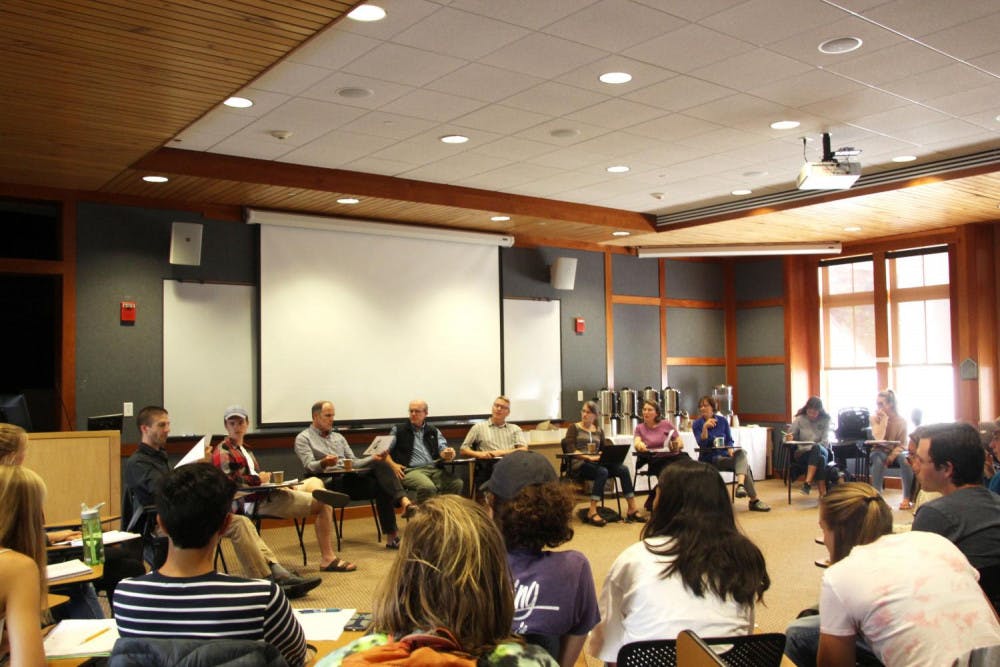This past summer was the first time since 1893 that eight or more major hurricanes formed in a row in the Atlantic. This hurricane season was also the only season on record with three hurricanes with an Accumulated Cyclone Energy (ACE) — a scientific measure of the strength of the hurricane — over 40.
Only 26 of 424 Atlantic hurricanes since 1950 have had an ACE value above 40, making this summer anomalously active for a hurricane season. This level of activity and the devastating effects of these hurricanes have elicited many questions, many of which were addressed at the “Harvey, Irma, Maria: A Community Teach-in” event at the Franklin Environmental Center at Hillcrest on Sept. 29. The event gathered students and faculty alike to discuss these questions and the implications of this summer’s flurry of hurricanes.
The moderator of the discussion, economics professor John Isham, began by asking participants to posit the questions they had in order to create a list of questions before the discussion started. Questions ranged from specifics about the correlation between climate change and hurricanes to the media’s reaction to the hurricanes. The breadth of subjects touched by these questions emphasized how interdisciplinary a conversation about hurricanes should be, a need which was only reinforced throughout the conversation.
The first question discussed was the relationship between climate change and hurricanes. Environmental studies professor Molly Constanza-Robinson said the general conclusion of scientists was that “we aren’t causing them, but we’re intensifying them.” Dan Brayton, an English and American studies professor, backed Costanza-Robinson up by making clear that behind the complicated science of hurricanes lies the simple fact that “hurricanes are all about warm water.” Not only do hurricanes form over warm water, but they are also intensified by warm water. Together, the professors’ responses make clear that climate change is causing a rise in sea temperatures, which allows hurricanes to intensify easier.
From there, the conversation branched into the tragic situation in Puerto Rico. Puerto Rico was hit by category four Hurricane Maria on Sept. 19, causing the entire island to lose power, cell coverage and running water. This, coupled with the destruction of buildings and roads, has caused a dire and dangerous situation for all Puerto Ricans.
One student brought up how it took the United States a full week to lift the Jones Act to allow Puerto Rico to receive aid from other countries. The Jones Act prevents Puerto Rico from trading with any country but the United States, and delineates that if a ship from any other country wants to go to Puerto Rico, it must get explicit permission from the U.S. government.
This brought up questions about the role the United States should play in aiding Puerto Rico. Professor Isham described how Puerto Ricans are subject to U.S. Federal Taxes and economic limitations like the Jones Act without the privileges of U.S. citizenship. He viewed these as important aspects of this “post-colonialist” period in history.
Professor Rebecca Gould mentioned how the U.S. government said it was difficult to access and aid Puerto Rico due to its poor infrastructure, and said the government should instead be asking itself what is actually causing that poor infrastructure. Costanza-Robinson brought up how rich Americans in hedge funds profit off loans to Puerto Rico, the process of which is throwing Puerto Rico into increasing debt. She noted how this exemplifies the power of a small group of rich Americans to control the fate of millions of people.
Later in the conversation, Alec Fleischer ’20.5 of the Divest Middlebury movement brought up this point. He described how Middlebury is still invested in companies like these hedge funds and asked the question, “How are we different from these hedge funds if we’re still invested in them?”
Joseph Holler, a geography professor, then passed around a paper that showed a map that was part of the Flood Insurance Study done in New Orleans after Hurricane Katrina. The map was blanked out by a white square with writing on it that said “Flood hazard information for this portion of the transect has be superseded by the revised interior drainage analysis performed in 2014.”
Holler described how political processes redacted the actual flooding hazard information. Now companies are building and rebuilding in New Orleans as though it is safer than it was before Katrina, regardless of the fact that, in reality, it is not.
Isham concluded the discussion by asking the group, “What should we do?” One student’s response was to simply elect the right people. Participants generally agreed with this as a solution, though there was some debate about how to elect the right people. Another student lamented how he felt that those who are currently in the position to be elected are not people he would want to elect. Another student brought up the need to inform voters on the issues brought up in this conversation, from climate change to the U.S. international affairs in Puerto Rico.
This conversation brought up a lot of important problems surrounding this past hurricane season, too many to address in this article alone. While not all the mentioned issues were about the hurricanes themselves, they were all directly tied to the causes and devastating effects of hurricanes. This reporter left the conversation not feeling very optimistic about the issues that were brought up, but was impressed by the intelligent and open discussion. Conversations like these and the actions that result from them are vital if we are to address these challenges we face as a college, as a nation and as humans.




